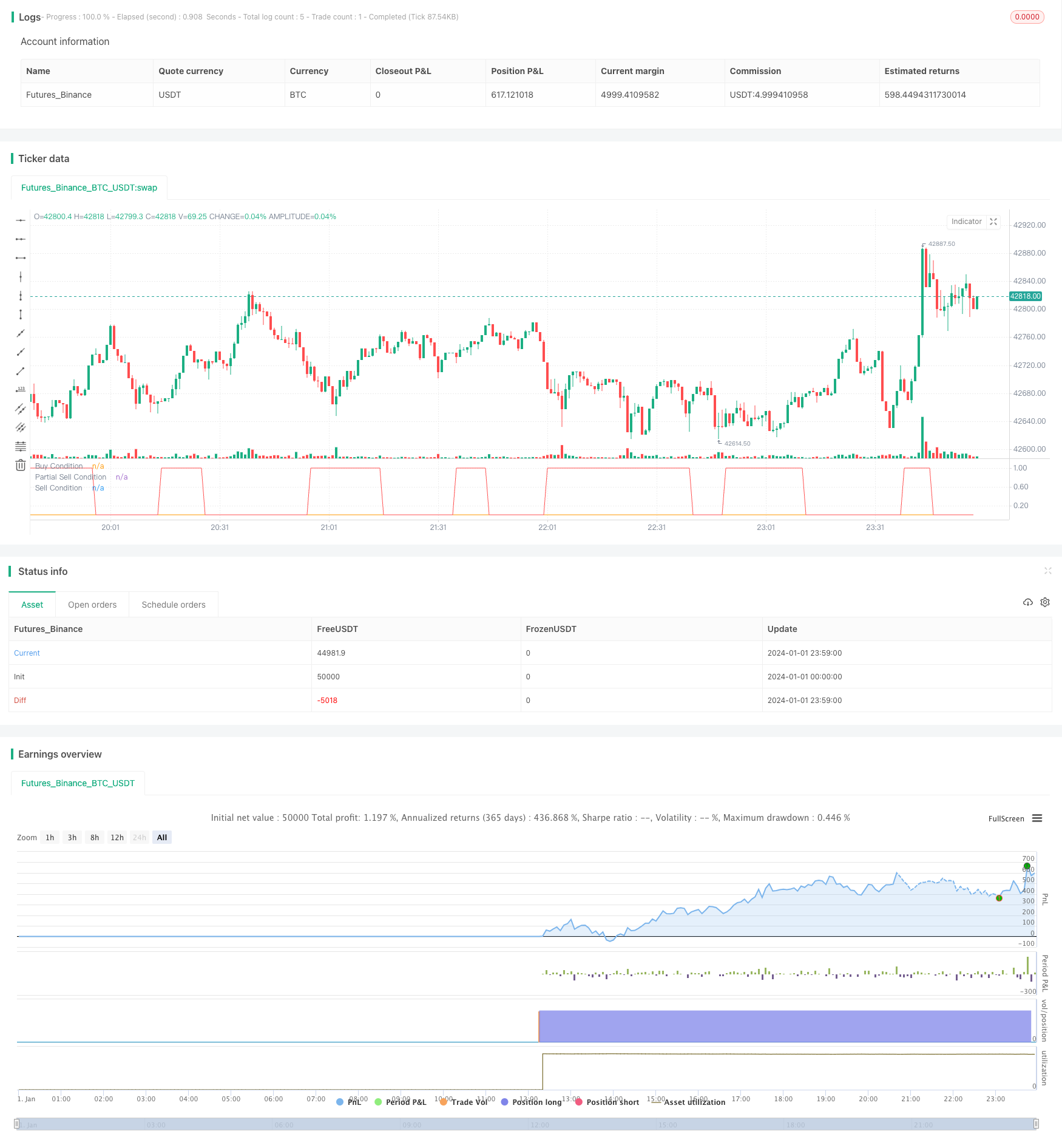Estratégia de inversão de impulso
Autora:ChaoZhang, Data: 2024-01-03 17:14:15Tags:

Resumo
Esta estratégia é uma estratégia de reversão de momento baseada em médias móveis e no índice de força relativa (RSI).
Estratégia lógica
A estratégia usa uma média móvel de 14 dias como linha de sinal rápida e uma média móvel de 28 dias como linha lenta.
Quando o MA de 14 dias cruza acima do MA de 28 dias e o RSI está abaixo de 30 ou o RSI está abaixo de 13, ele sinaliza uma reversão no ímpeto para cima, provocando uma entrada longa.
Além disso, a estratégia tem um mecanismo de lucro parcial: quando o lucro da posição aberta atinge o nível de lucro definido (default 8%), ele irá obter lucro parcial (default 50%).
Análise das vantagens
A estratégia combina as vantagens das médias móveis, evitando perdas de fenda.
-
Usando médias móveis rápidas e lentas filtra algum ruído.
-
Os indicadores RSI mostram níveis de sobrecompra e sobrevenda, evitando a busca de novos máximos.
-
O lucro parcial bloqueia alguns lucros e reduz o risco.
Análise de riscos
-
A dupla média móvel pode produzir crossovers, levando a perdas.
-
O nível de lucro pode ser ajustado para equilibrar risco versus recompensa.
Orientações de otimização
-
Teste diferentes combinações de parâmetros de médias móveis para encontrar configurações ideais.
-
Teste diferentes níveis de limiar do RSI.
-
Ajustar o nível de lucro parcial e o rácio de venda para equilibrar o risco/recompensa.
Conclusão
Em geral, esta é uma estratégia típica de reversão média. Ele usa cruzes MA rápidas / lentas para determinar as voltas do mercado complementadas por RSI para filtrar sinais. Ele também implementa a tomada de lucro parcial para bloquear alguns lucros. A estratégia é simples, mas prática. Os parâmetros podem ser ajustados para atender a diferentes condições do mercado.
/*backtest
start: 2024-01-01 00:00:00
end: 2024-01-02 00:00:00
period: 1m
basePeriod: 1m
exchanges: [{"eid":"Futures_Binance","currency":"BTC_USDT"}]
*/
//@version=3
strategy(title = "14/28 SMA and RSI", shorttitle = "14/28 SMA and RSI", overlay = false, pyramiding = 0, default_qty_type = strategy.percent_of_equity, default_qty_value = 100, currency = currency.USD)
src = close, len = input(14, minval=1, title="Length")
take_Profit=input(8, title="Take Profit")
quantityPercentage=input(50, title="Percent of Quantity to Sell")
closeOverbought=input(true, title="Close Overbought and Take Profit")
up = rma(max(change(src), 0), len)
down = rma(-min(change(src), 0), len)
rsi = down == 0 ? 100 : up == 0 ? 0 : 100 - (100 / (1 + up / down))
longCondition = 0
sellCondition = 0
takeProfit = 0
quantityRemainder = 100
smaSignal = input(14, title="SMA Signal Period")
smaLong = input(28, title="SMA Longer Period")
if ((sma(close, smaSignal) >= sma(close, smaLong) and rsi<= 30) or (rsi<=13)) and strategy.position_size==0
longCondition:=1
if longCondition==1
strategy.entry("Buy", strategy.long)
profit = ((close-strategy.position_avg_price)/strategy.position_avg_price) * 100
if sma(close, smaSignal) <= sma(close, smaLong) and strategy.position_size>1
sellCondition := 1
if strategy.position_size>=1
if closeOverbought == true
if profit>=take_Profit and takeProfit == 0
strategy.exit("Take Profit", profit=take_Profit, qty_percent=quantityPercentage)
takeProfit:=1
quantityRemainder:=100-quantityPercentage
if sellCondition == 1 and quantityRemainder<100
strategy.close("Buy")
if closeOverbought == false and rsi>70
strategy.close("Take Profit")
plot(longCondition, "Buy Condition", green)
plot(takeProfit, "Partial Sell Condition", orange)
plot(sellCondition, "Sell Condition", red)
- Estratégia de acompanhamento da tendência de impulso
- Quantidade de tendências seguindo estratégia
- Estratégia da média móvel do filtro do casco
- Estratégia de poder dos ursos
- Estratégia de cruzamento de média móvel dupla
- Estratégia quântica de reversão dupla da OCM
- Estratégia de cruzamento do RSI e do SMA
- Estratégia de ruptura da banda de Bollinger
- Estratégia de acompanhamento da dinâmica de preços
- Estratégia de negociação em rede baseada no sistema de médias móveis
- Estratégia de acompanhamento da tendência da média móvel cruzada
- Fibonacci Golden Ratio e Relative Strength RSI estratégia
- Estratégia de negociação integrada de inversão e centro de gravidade baseada em estratégias múltiplas
- Estratégia de cruzamento de médias móveis exponenciais duplas e triplas
- Bollinger Bands Breakout Swing Estratégia de Negociação
- Estratégia de inversão de tendência de rastreamento
- AlexInc's Bar v1.2 Estratégia de acumulação de breakout baseada em filtragem de barras significativa
- Estratégia de negociação de quantidade de ações combinando média móvel exponencial com stop loss e stop loss percentual
- Sistema de cruzamento da média móvel
- Fechar Compra Próximo Estratégia de Aproveitamento Aberto